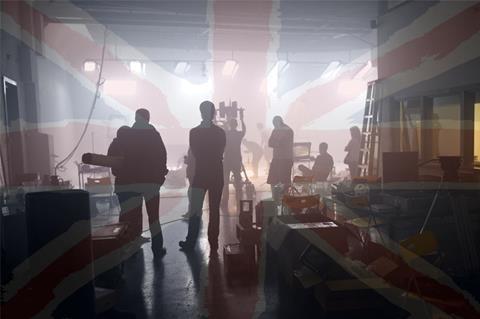
Film and high-end TV production spend in the UK reached £1.19bn in the last three months of 2020, the second highest quarter since the high-end TV tax relief was introduced in January 2007, according to figures released today by the British Film Institute (BFI).
However, total film and high-end TV spend in the UK was down 20% year-on-year at £2.84bn compared to the £3.61bn recorded in 2019, due to the devastating shutdown caused by the Covid-19 outbreak.
Of the total figure, film production represents £1.36bn, down 31% on 2019, while high-end TV production was £1.49bn, only 11% down on the previous year.
Figures released by the BFI reveal the full extent of the production shutdown last March, with just £400,000 spent on seven film productions and nothing at all on high-end TV during the second quarter of the year.
But as restrictions were eased, the introduction of production safety guidelines and recovery measures saw 81 projects begin Covid-safe shooting between July and September, generating £862.1m.
This accelerated in the final three months of 2020, with 76 film and high-end TV productions beginning filming, representing the near-record combined spend of £1.19bn. (The biggest quarter to date is the £1.54bn, recorded in Q3 2019).
Films that began shooting in the UK in the last three months of the year include Marvel sequel Doctor Strange In The Multiverse Of Madness and Disney’s live-action The Little Mermaid.
UK independent features
The figures were less positive for the homegrown production sector, with spend on local UK features reaching £120m, just 9% of the total spend in 2020. This is down from the total £175m spent on UK independent film production in 2019, also 9% of that year’s total. When compared to 2018, last year’s figures are down by 62%.
UK features that began shooting in the final quarter of 2020 include Craig Roberts’ The Fantastic Flitcrofts, starring Mark Rylance, Aml Ameen’s Boxing Day and Jim Archer’s Brian & Charles.
Inward investment and co-production spend on film and high-end TV in the UK reached £2.36bn, with £1.24bn spent on feature films and £1.13bn on high-end TV production.
Speaking to Screen, BFI chief executive Ben Roberts said there were plans to undertake “a real look under the bonnet” of the UK independent film sector to get to the root of falling spend.
“We’ve recognised that we need to keep very alert in terms of the prosperity of our independent sector because it’s vital for everyone that it’s alive, well and growing,” said Roberts.
“We are going to take a look at what has changed over the last five to 10 years in terms of the cost of the trickle-down of income throughout the independent film life cycle to really understand what’s happening there and what we can do to ensure it remains robust and vibrant”.
Record number of films receive film tax relief
The BFI figures also revealed a record 385 films benefited from the UK’s film tax relief, the highest number since its introduction in 2007.
These comprised titles that were generally shot prior to the start of 2020, but received final certification of tax relief last year and include Sam Mendes’ Oscar-winner 1917, Danny Boyle’s Yesterday and upcoming musical adaptation Everybody’s Talking About Jamie.
Total UK spend by those productions, at £1.9bn, was a 14% decrease on a record £2.2bn in 2019.
Last year also saw 16 official co-productions receive final certification. They had a UK spend of £28m and a combined budget of £75m. The number of co-productions is the third highest of the last decade and has increased by three from 2019.



































No comments yet